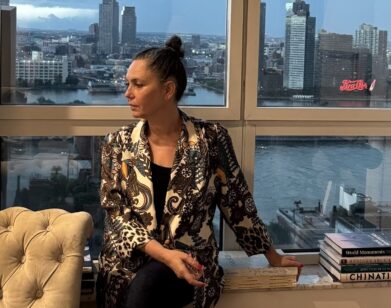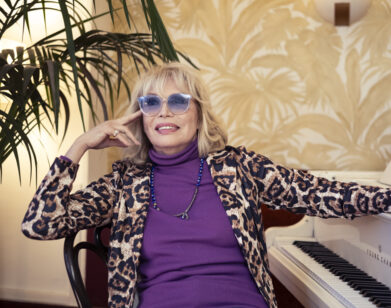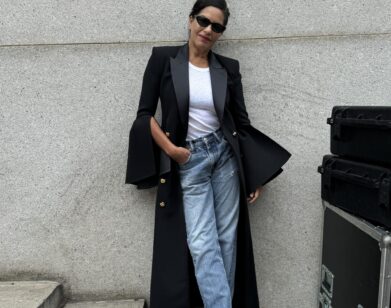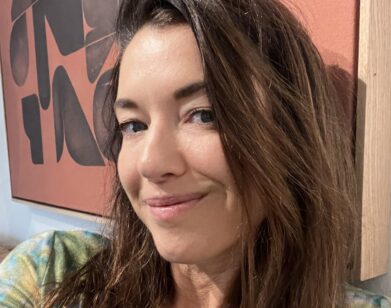The Real Housewife: Louise Lasser
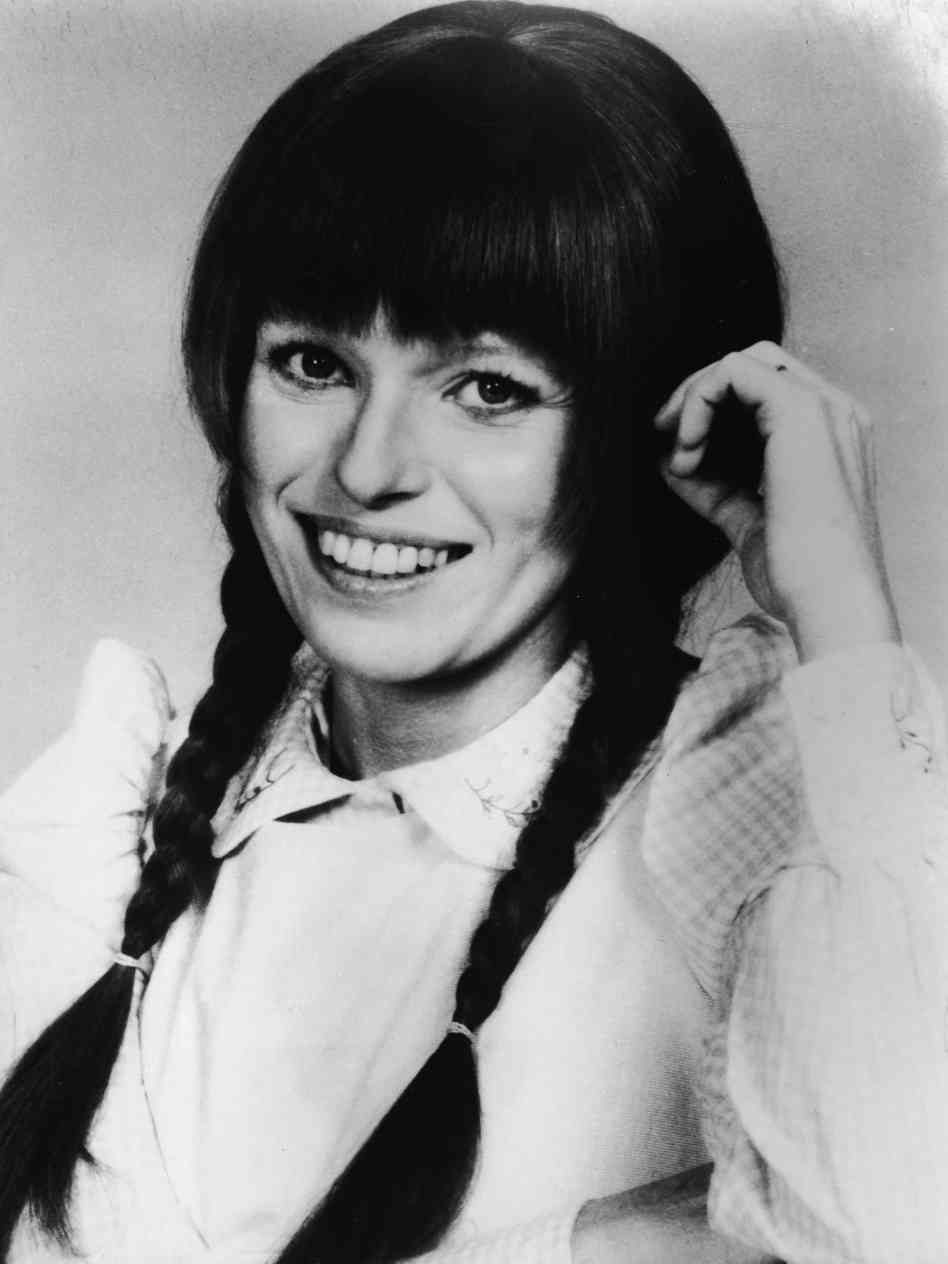
ABOVE: LOUISE LASSER IN CHARACTER AS MARY HARTMAN.
On January 5, 1976, television sitcom luminary producer Norman Lear (All in the Family, The Jeffersons) unveiled his most unique creation, the soap-opera satire Mary Hartman, Mary Hartman. In her signature braids, actress Louise Lasser, already a co-star and ex-wife of Woody Allen, brilliantly portrayed the titular Mary, a housewife struggling with adversity on all sides. Mary was deeply affected by the commercial media of her time, and came to represent the American psyche en route to a nervous breakdown. The show garnered a strong cult following, but many viewers were not ready for its more subtly paced dramatic comedy, featuring many an awkward pause. (With no laugh track, how were viewers to know what was funny?)
Adultery, impotence, a mass murder of a family plus their goats and chickens, and a basketball coach drowning in a bowl of soup all occurred while Mary contemplated the yellow waxy buildup on her kitchen floor with a far-off gaze. Rejected by all the networks, the low-budget show went straight to syndication for its 325 episodes in a year-and-a-half-long run. The series’ brief, but prolific and lasting life set the stage for offbeat, dark comedies to come and cast an enduring shadow over Louise Lasser’s life and career.
We joined Lasser in her Upper East Side apartment during what was to become an impromptu pizza party with her partner Michael Citriniti to celebrate Shout! Factory’s release of the massive 38-disc Mary Hartman, Mary Hartman DVD box set.
TOBY GOODSHANK: I read on the Internet that you started out doing singing gigs and Broadway performances, is that correct?
LOUISE LASSER: Yeah, but that was like a hundred years ago. I’m surprised even the Internet still has that. [laughs] Yeah, when I was 20. I sang on Broadway, I acted. I didn’t like it all that much. It was too scary to me.
GOODSHANK: You replaced Barbra Streisand in I Can Get it for You Wholesale.
LASSER: Yeah. Streisand was electric. She stopped the show and then when I did it, no one knew when a song was over. I was so scared. It was the first time that I was on stage.
DEENAH VOLLMER: The Mary Hartman box set is beautiful. How do you think audiences today will perceive the show?
LASSER: I have absolutely no idea. I think it’s a really good show, I always thought it was a really good show because it touches so many aspects of everything. It’s sort of up and down and in and out, and before you know it, there you are. And then it itched such rich subjects, do you know what I mean? People always say it’s way ahead of its time. I never thought it was ahead of its time. I always thought it was of its time.
GOODSHANK: Yeah, that’s one of the things you mentioned in the DVD bonus disc.
LASSER: Is this the one with Norman and Mary Kay [who portrays country singer Loretta Haggers on the show] and I?
GOODSHANK: Yup.
LASSER: Someone showed me that the other night, I loved that.
GOODSHANK: It came out great.
LASSER: Yeah, that was great. And it went three separate places three different years and times, I think. I saw it and I was like, “Wait, where were we now? How was I here? How was I here?” You know, like that.
GOODSHANK: Movie magic. Creator Norman Lear said that the show was about the typical housewife’s relationship to the media. In the show you really see the commercials’ influence on Mary and how she’s always talking about certain cleaning products or different types of coffee. There are times when she’s cleaning and watching television and she seems almost mesmerized by it.
LASSER: With Mary, the whole society was being run by the media. Your feelings started to be affected very much by an existential, nothing-commercial, do you know what I mean? It was almost like… the show was [in a ditzy singsong] “da da da da da da da,” and then underneath were these rumblings of something really foreboding, something really unhappy and unpleasant. And you don’t know what it’s about, even though you think you know what it’s about. Even playing it, you don’t really know what’s going around the corner, you don’t know what that feeling is, of such disquiet, and pain. We didn’t really have that in shows before.
Mary doesn’t know what’s happening to her. Someone says, “Do this, go there, do this, buy this, buy this.” It eventually just sucks the soul out of her. Because she has no idea how she feels about anything, and her life is so awful. Her relationship with her husband, who she thinks is the best, and her relationship with the daughter, her daughter hates her and she hates the daughter, it’s both, they hate each other.
And it was the ’70s, when people were trying to find themselves, and they didn’t know what was going on. And then after that, everything exploded. It was like this boring place, and then everything exploded, only no one knew what was happening. You know what I mean? I see it as a sad story.
GOODSHANK: It appears to me that a lot of the characters have this self-image that’s constantly being threatened by the events going on around them. For instance, Mary has an almost 1950s perfect homemaker ideal. In the interview you refer to her as having “optimistic shoulders”—
LASSER: Yes, the woman who did my costumes, she asked me what I liked and I said I liked plaids and braids and stuff like that. And then when she did it she drew the shoulders of that dress, and she said, “Look, I’ve made you optimistic shoulders.” Which was so perfect for Mary and the world where everything was falling apart around her, and she’d have these optimistic shoulders, you know. They had a lot of brilliant people on that show.
GOODSHANK: Was it a fun cast to work with? Was it too much of an intensive schedule to really enjoy…
LASSER: Oh, of course. They usually make one show a week for eight weeks, and for us they made five shows a week for eight weeks and then we had a week off. So it was exhausting. And then they stepped up the schedule so we’d make 10 shows a week, and then everyone started to frazzle, you know. It’s like a record just going too fast and suddenly it all amps up.
GOODSHANK: Were you able to harness that energy in the episode where you have the nervous breakdown? Did all that energy feed into your performance at that time?
LASSER: For me, everything led up to that. They said, “What do you think should happen to her next?” I remember I was surprised when they asked me. I remember taking a beat and thinking, “I think she’s got to have a nervous breakdown, because you can’t be this bombarded without…” Do you know what I mean? And this was equivalent to America’s nervous breakdown that we were all starting to go through too fast, and you didn’t know what anything meant and nothing meant anything. And that nothing meant anything equaled everything else meaning nothing, do you know what I mean? I once said that I thought she was like a survivor that lived in a world that might not be worth surviving in, you know?
VOLLMER: Did you feel that way about yourself, too? That you were a survivor of a world you didn’t want to live in?
LASSER: I did. I started to feel that way. So even though it was fun and the part was so much fun and there were so many funny things in it, you couldn’t get away with it. It was just askew. I had to instinctively go to the dark side. I know people think it was this very light, funny show, and it was this funny show, but the humor came from a great angst inside.
VOLLMER: How did you recover from that, personally, that dark place?
LASSER: I don’t know, I don’t think I ever did. I think I had a dark place in me ahead of time. While I didn’t intellectually think about it, there was a lot of it in my life that I wasn’t aware of. I became more deeply aware about depression, about other things, the bipolarity of the world. That character—the whole thing is like a post-traumatic incident. Even though I think there were hilarious things in that show that could somehow turn it on its side—that’s what I’m so proud of it for. Not its messages but how quickly it turned, and then crashed.
GOODSHANK: I feel like one of the main strengths of the show is how those masterfully comedic moments heighten the heavily dramatic ones that also occur.
LASSER: They sort of coexist on the show. It was like this. We lost a writer, Daniel Gregory Browne, a terrific writer, very dark, angular writer. He eventually committed suicide. He’s writing comedy and comedy and comedy, and then he kills himself. It’s so perfect. But this was always going on, this undertone, and writers had so many episodes to write and no one has ever, you know, written 130 episodes with three people. It was incredible.
VOLLMER: Why were they so ambitious about doing so many episodes?
LASSER: The stations. Because we weren’t network, which meant that we were syndicated. It was like, we will buy your show if you deliver us 10 episodes in this amount of time. So we were so grateful to be on the air, it was a really humble little show, a real kitchen-sink show, nothing fancy. If we made mistakes, we wouldn’t do it over. It’s one of the things I love about it. The rule was not to do it over.
VOLLMER: So the vast majority of scenes were done in one take?
LASSER: Yeah. We would be getting a different script every day. You learn the rhythm of it, you learn it after all, and when you start to get tired, really tired after just too many shows, you get sloppy. Because you’re just tired. You can’t withstand that. And I used to think that would show on the show and then you’d try to freshen it up, you’d do anything, but you know by then the show just had its own life.
VOLLMER: Was that a surreal experience for you? Working so hard and doing so many episodes? Could you differentiate between when your real life began and Mary Hartman’s ended?
LASSER: No, not after a while. That was the torture of it. That’s what’s also interesting about that show. The fusion. You don’t know where one starts. I remember having one line early on in the first season and my husband’s girlfriend caught a venereal disease. Everything happened, the mass murders, my sister gets pregnant, and I’m going, I don’t really understand anything. This is happening, this is happening, and now this is happening. I remember I said the line, “This is beginning to sound like a soap opera.” You are what you become.
VOLLMER: Were you married to Woody Allen at the time of the show?
LASSER: No, it was right before that.
VOLLMER: Was Woody Allen a fan of the show?
LASSER: I don’t know. He was so busy then, and I was so busy then, that we barely had time to sit and talk about work. In one sense, why wouldn’t he be, and in the other, why would he be? I love his work. That relationship was a very influential relationship, on every level. It’s interesting to see that. I’ll forever be influenced by his work. A lot of my best work comes from his work. Some meaning and some not even meaning to.
VOLLMER: Was that intimidating to you? To be married to someone who influenced you so much?
LASSER: No, I loved it. I always thought it’s so great when people meet someone they can stretch with, that you want to be better than you are and they can stretch you.
VOLLMER: When Mary Hartman ended, was there a withdrawal period for you?
LASSER: I’m still withdrawing. You keep asking me. No, it never leaves, it never goes away. Now it’s resurfaced again. Because of the box set and interviews, people asking questions.
VOLLMER: Are you still in touch with your husband from the show, Greg Mullavey?
LASSER: Oh, I love him. I think he’s still my husband. If we’re at a table with other people, he’s definitely my husband.
VOLLMER: Ha. What projects do you have coming up?
LASSER: I did two episodes for the next season of Girls. I played a photographer who is rediscovered and has a show in a gallery. I really like working with Lena. We could communicate well. She does something I love. She always plays as smart as she is.
[Lasser’s partner, Michael Citriniti, brings in pizza.]
GOODSHANK: The box set is beautiful. Congratulations.
LASSER: At least if no one buys them, we have them now.
VOLLMER: Have you done anything to celebrate the release?
LASSER: I think this is it.
LOUISE LASSER CURRENTLY TEACHES ACTING AT NEW YORK’S JOHN DESOTELLO ACTING STUDIO AND WILL APPEAR ON THE UPCOMING SEASON OF GIRLS, PREMIERING JANUARY 12. THE MARY HARTMAN, MARY HARTMAN BOX SET IS NOW AVAILABLE VIA SHOUT! FACTORY.

